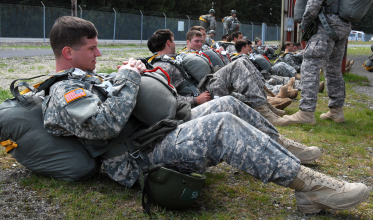As ROTC students, Will Thibeau and Matt Coughlin, both FCRH ’14, knew they were likely bound for the Army once they finished college. But after graduating from Fordham last May, the former roommates decided to take their journey into the Army a step further than most of their peers — they volunteered to be Army Rangers.
The average civilian likely has no idea what an Army Ranger is, or what he does (currently, only men can be Rangers). But, within the armed forces, they demand a lot of respect.
That’s because Rangers, as the Army’s website proclaims, are an elite, “lethal, agile and flexible force, capable of conducting many complex, joint special operations missions.” In order to become a Ranger, a soldier has to endure and pass a series of tests that the Army calls one of the “toughest training courses for which a soldier can volunteer.”
On paper Ranger School is fairly straightforward. After finishing basic training and prep work, volunteers enter a series of phases they have to pass, one after the other. If they fail a phase, or quit, they cannot continue.
First comes the Ranger Assessment Phase, or RAP Week, where the would-be Rangers are put through mental and physical assessments. If they hold up under the pressure, they move to the first real phase in Camp Darby, Georgia, where they learn to operate in small units and practice situational exercises. Then comes a phase of platoon training in the mountains, held in Dahlonega, Georgia. Finally, the volunteers move to Elgin Air Force Base in Florida for the swamp phase, where they navigate wetlands and practice more complicated combat scenarios.
This process is easier said than done.
Thibeau and Coughlin are now in the swamp phase and nearly finished with their training. But even so, they are quick to say — with some level of superstition, perhaps — that they have not passed yet. They are even quicker to emphasize how lucky they feel to have made it this far.
Thibeau, in fact, almost did not make it through the first week. On his initial attempt, he failed the very first challenge: doing 49 pushups in two minutes.
“My grader didn’t think I did 49 pushups, and so I failed and I had to be retested,” he explained. “The very first thing I tried to do, I failed.” He passed the second time he tried, just minutes later.
But, Thibeau said that was a good introduction to the psychological games you play with yourself under extreme stress. Getting one to two hours of sleep every night on limited food with instructors yelling at every turn, he said, was what broke a lot of people.
And by a lot, he really did mean a lot of people. Only about 50 percent of the original volunteers graduate from Ranger School, with 60 percent of those failures occurring in the dreaded first week. The odds get better as the phases progress, with 98 percent of those who start the Florida phase eventually passing.
In the first week, Coughlin and Thibeau explained, a lot of the issues are physical — some of the men’s bodies just cannot meet the demands. But, mental strain is common as well, especially as the training progresses into its advanced phases.
“I know one guy, he was convinced he had this knee injury,” Thibeau recalled. “He kept going to the medics because of this pain he supposedly had, and eventually the medics said, ‘Listen man, you’re not hurt. You don’t have a knee injury. You need to either continue, or quit.’ And he chose to quit.”
It can be torturous. So why, then, do people like Coughlin and Thibeau volunteer?
Thibeau said a big part of his decision was a feeling that he had to prove himself worthy before entering the Army.
“Ranger School is the toughest test of tactical leadership the Army has to offer. I didn’t want to start my career …without taking [it],” he said. “For infantry…earning your Ranger tab is essential to proving your ability as a leader of men to your subordinates and superior officers.”
And as for Coughlin, there was a feeling of inevitability, as well as impending pressure to be a respectable leader.
“It is expected that all infantry officers will complete Ranger School prior to getting to their first job assignment, [so] it was an easy decision to volunteer…knowing my responsibility to the future soldiers I would lead.”
Everyone, it seems, has his reasons. But as for the question of why some volwunteers are able to pass, while other perfectly able men are taken out by their own psyches, it seems there is no clear answer.
Maybe it is mental strength, or stability, or perhaps stronger determination.
Thibeau himself has not quite figured it out yet. But he does know one thing.
“I quit every day,” he said. “Every day. I just say, ‘I’m going to quit tomorrow. I’m going to quit and that will be that.’ And then tomorrow comes and I say, ‘I can’t do it today yet.’ And I just keep going.”





